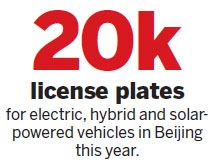Biggest concern
Despite the incentives, many are reluctant to buy a green-energy model, with their biggest concern the travel range.
Cui Lina, a 28-year-old office worker, said "most fully charged electric cars can run about 140 kilometers - it is too short a distance if you drive in big cities like Beijing".
"You have to plan in advance where to go and how far the destination is before you start the car. Otherwise you won't be able to get back home if the car runs out of electricity."
Cui said many drivers also dislike electric cars due to reports of less power than conventional vehicles, not a popular characteristic with young people who often have a passion for speed.

And because they are something new in China, she doubts the quality of new-energy cars is as good as well-tested traditional vehicles.
Fan Mingsong, a 35-year-old telecom engineer, also has concerns.
"There are few charging stations in the city and I hear it is expensive to replace the batteries," said Fan.
China News Service reported that there were about 70 charging stations in Beijing by the end of 2013, most of them serving buses, taxis and other public vehicles.
The Beijing government announced it will build 1,000 charging stalls in 2014 with its long-term target to have stations within five kilometers of any locale in the city.
Still, Fan said a green car won't be his first choice, at least not in the near future.
But he added that he would not mind trying if automakers produce good cars and offer good after-sales service.
Due to the wait-and-see attitude among potential buyers, sales have been tepid.
Statistics from the China Association of Automobile Manufacturers show that China produced and sold about 17,500 clean-energy cars in 2013, a tiny portion of the 18 million passenger vehicles sold.
Huge potential
Despite the challenges, both foreign and Chinese brands are confident about the potential of the huge Chinese market and are speeding up efforts to come up with reliable clean-energy models.
Tesla Motors announced in January that its Model S electric sedan that can travel up to 500 km is now available in China.
It sold 22,300 Model S vehicles around the globe in 2013 and hopes to double its annual sales in 2014 "with high expectations for the China market", said Jerome Guillen, Tesla's vice-president for sales and service, in an interview with China Daily in January.
"Although we are not eligible for the central government's subsidies now, we hope to acquire local non-financial support such as free license plate allocations in big cities and favorable parking measures to make the car more attractive to potential owners," he said.
The carmaker also indicated that it would build a free-to-use charging network across China to facilitate the use of its electric vehicles.
Daimler AG became the first European manufacturer to import an electric vehicle as it kicked off sales of its smart fortwo electric drive for individual customers in Beijing and Shanghai last November.
Annette Winkler, global head of smart, told China Daily that the company is "actively communicating with regional governments city by city for some incentives or local support".
Daniel Lescow, head of smart China, said he is personally positive the policy support will be there.
"It can be non-cash incentives such as free parking or free access to a license plate in Beijing, or zero payment for the plate in Shanghai," Lescow said.
BMW Brilliance unveiled the 1E, the first electric crossover of its new brand Zinoro, at the Guangzhou auto show in November. It said the model will hit the market this year.
Based on the BMW X1 platform, the Zinoro 1E is powered by a lithium iron phosphate battery widely recognized for its stability and safety, said the automaker.
Ge Shuwen, deputy head of FAW-VW
BYD's hybrid car Qin caused a sensation due to its design and performance when it was unveiled at the Shanghai auto show in April 2013. SAIC had invested 4.6 billion yuan in clean-energy models by late 2012, with more than 1.1 billion yuan spent on developing its hybrid Roewe 550, according to the China Securities Journal.
